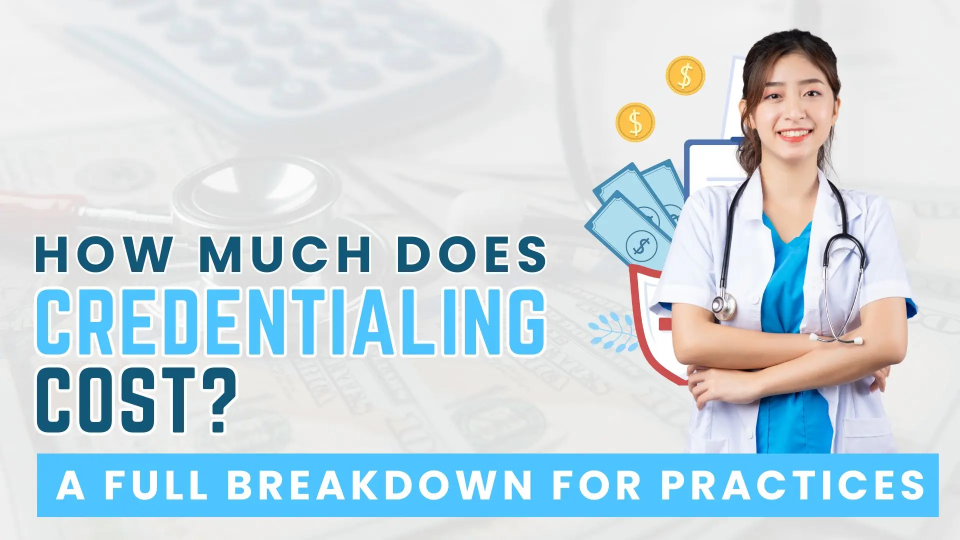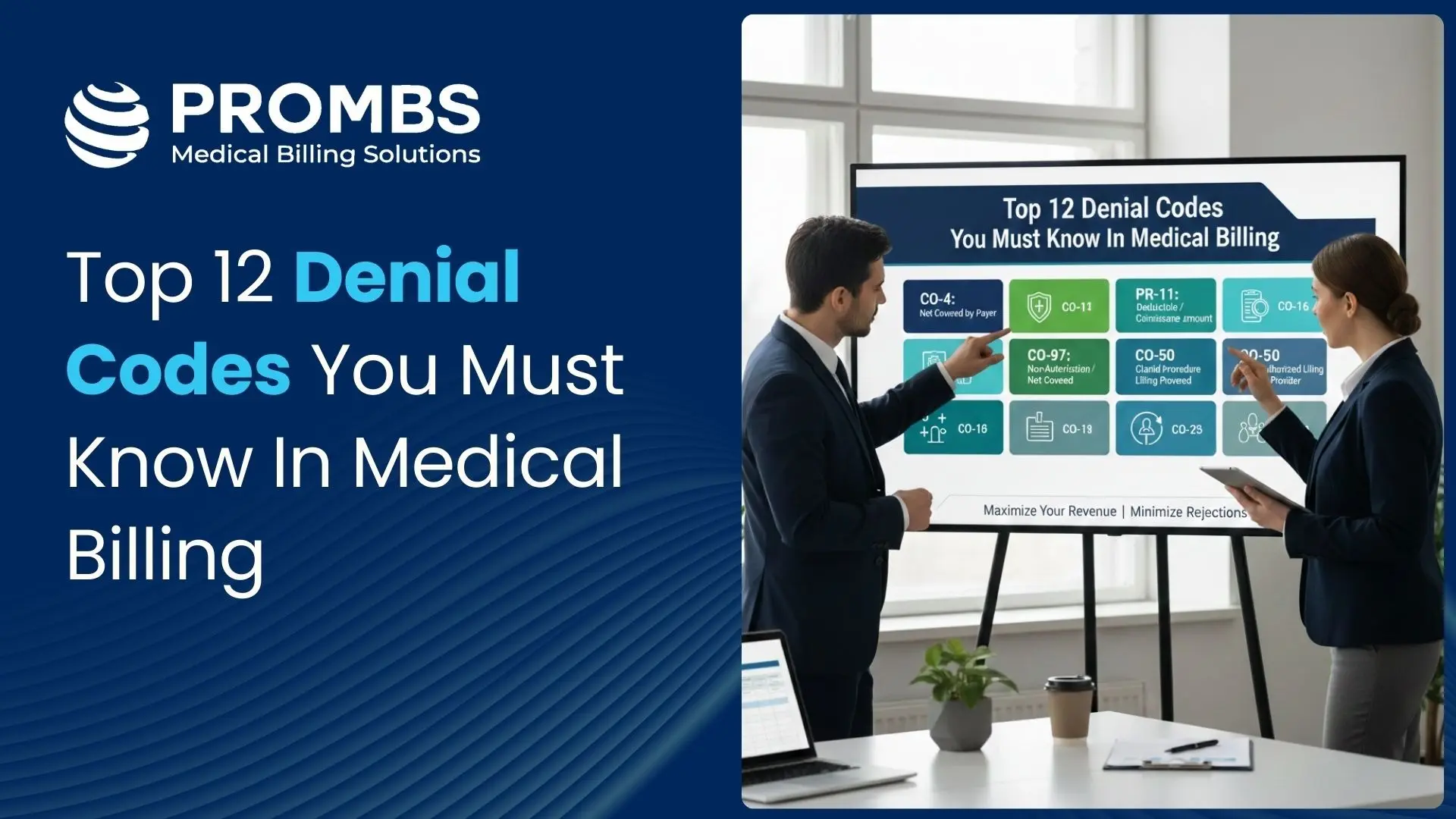Credentialing is one of the first steps healthcare providers must complete before they can begin treating patients and receiving reimbursements. It involves verifying a provider’s qualifications, licenses, and professional background, and obtaining approval from insurance companies or healthcare networks to join their panels.
But how much does credentialing cost, and is it worth the investment?
In this article, we’ll break down the different types of fees, compare the costs of doing it in-house vs outsourcing, and explain how the right approach can save your practice time, money, and future headaches.
What Is Healthcare Credentialing?
Credentialing verifies a provider’s qualifications, such as their medical degree, board certifications, state licenses, and work history. It also includes background checks, malpractice insurance verification, and compliance checks with regulatory bodies.
Credentialing is required for:
- Billing insurance companies
- Obtaining hospital privileges
- Complying with state and federal healthcare laws
- Participating in provider networks
Without credentialing, providers cannot legally or ethically operate in many healthcare settings.
Major Types of Credentialing in Healthcare
1. Insurance Credentialing
Also known as payer credentialing, this is required for a provider to bill insurance companies for services. This process involves verifying the provider’s qualifications and enrolling them with commercial insurers, such as Aetna, Cigna, and UnitedHealthcare, as well as government programs like Medicare and Medicaid.
What It Involves:
- Applying to each insurance company
- Providing documentation like licenses and malpractice coverage CAQH profile completion and maintenance
Average Cost:
- In-House Processing: $250 to $350 per payer
- With a Credentialing Company: $250 to $500 per payer
- With Our Services: Just $200 to $300 per payer
Our team at Pro-MBS offers tailored payer enrollment and credentialing support so you don’t have to navigate this complex process alone.
2. Hospital Credentialing
For providers who want to work within a hospital setting, this type of credentialing is mandatory. Each hospital has its own hospital credentialing requirements, which usually include in-depth background checks, peer references, and interviews with credentialing committees.
What It Involves:
- Hospital-specific application and forms
- Verification of clinical history and experience
- Review by a medical staff office or credentialing committee
Average Cost:
- $500 to $1,000 per hospital, especially if the process includes additional requirements like privileging
- Larger institutions may cover some or all of this cost internally
3. Medical Board Credentialing
This type is more of a prerequisite than a recurring credentialing process. Medical board credentialing is the licensing and certification process required to practice medicine in a given state legally.
What It Involves:
- Passing board exams
- Submitting transcripts, test scores, and professional history
- Background checks and fingerprinting
Average Cost:
- $300 to $1,000, depending on the state and specialty board
- The license fee is apart from the service charges
4. Delegated Credentialing
Some healthcare organizations choose to delegate credentialing to third parties like medical groups or managed service organizations. These organizations are responsible for verifying and maintaining a provider’s credentials.
What It Involves:
- Contracts between the payer and the delegated entity
- Maintaining ongoing credentialing files
- Following NCQA or URAC standards
Average Cost:
- Varies by agreement, but can lower long-term operational costs when scaled
Hidden Costs You Shouldn’t Overlook
Administrative Labor
Delayed Reimbursements
Re-credentialing and Maintenance
Should You Use a Credentialing Service?
Handling credentialing in-house can be time-consuming and prone to delays. Many practices are turning to professional provider credentialing services to streamline the process.
Benefits of Outsourcing:
- Faster turnaround times
- Lower error rates in applications
- Regular status updates and compliance tracking
- Reduced administrative burden on staff
- Cost-effective for growing practices
How to Choose the Right Credentialing Solution
Look for Experience in Your Specialty
Ask About Turnaround Time
Ensure Ongoing Support
How Pro-MBS Can Help You Simplify Credentialing
Our physician credentialing services help healthcare providers navigate payer enrollment, hospital credentialing, and ongoing maintenance with ease. We work with independent practitioners, clinics, and health systems to ensure your credentials are always current and compliant.
Note: This is a rough quotation to help your practice estimate credentialing-related costs. Please note that final pricing will depend on payer requirements, provider specialty, state regulations, and the complexity of your case.
| Service | Details & Scope | Estimated Timeline | Estimated Cost (Per Entity/Payer) |
|---|---|---|---|
| Insurance Credentialing (Commercial & Government) | Enrollment with commercial payers (e.g., Aetna, Cigna, UHC) | 90–125 days | $200 – $500 |
| Re-Credentialing / Revalidation | Re-application & updates to stay active with payers | 60–90 days | $150 – $250 |
| Hospital Credentialing & Privileging | Application, documentation review, committee liaison | 90–180 days | $500 – $900 |
| Group or Facility Setup | Register group NPI, TIN setup, link to payers | 90–120 days | $300 – $450 |
| Medicare Enrollment (PECOS System) | New provider/group enrollment or revalidation | 60–120 days | $250 – $400 |
| Medicaid Enrollment | State-specific application and submission | 90–120 days | $250 – $400 |
| Add Provider to Group Contracts | CAQH update, payer applications, linking new providers under group NPI | 60–90 days | $200 – $300 |
| Delegated Credentialing Setup/Support | Policy creation, credential file maintenance, and audits (for MSOs, IPAs) | Custom timeline | Custom Pricing |
| Ongoing Credentialing Maintenance | Monitoring expiration dates, CAQH, reminders, updates | Ongoing | $75 – $150/month |
| Credentialing Audit / Compliance Review | Audit existing credentialing status and gaps | 5–7 business days | Free (Basic Report) |
Why Choose Pro-MBS
- Over 10+ years of experience in medical credentialing across 50+ specialties
- Dedicated account managers and real-time application tracking
- In-house compliance review and CAQH monitoring
- Support for solo practices, groups, hospitals, and MSOs
Interested in a Custom Quote?



